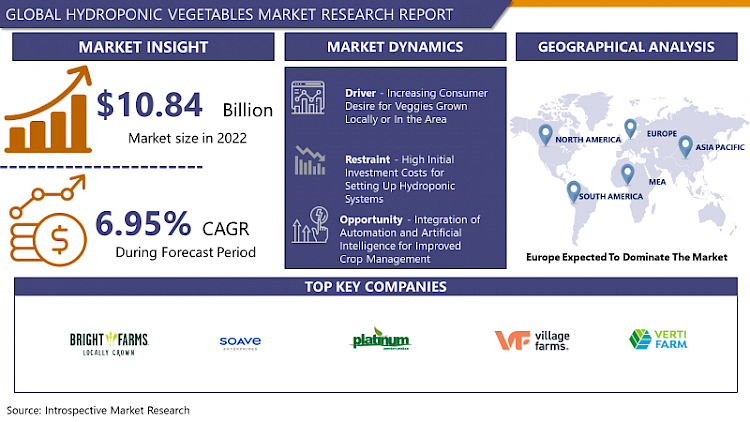Hydroponic Vegetables Market Synopsis
Global Hydroponic Vegetables Market Size Was Valued at USD 10.84 Billion in 2022, and is Projected to Reach USD 18.56 Billion by 2030, Growing at a CAGR of 6.95 % From 2023-2030.
Hydroponic vegetables refer to crops grown without soil, receiving essential minerals and nutrients directly through a nutrient-rich water solution delivered to the plant roots. This farming technique operates within controlled environments like greenhouses or indoor facilities, enabling precise control of temperature, humidity, and lighting.
- The growing demand from the educational sector is also driving the growth of the market. Hydroponic vegetables have wide-ranging applications across agricultural, commercial, and residential sectors. In agriculture, hydroponic systems provide a sustainable alternative for growing vegetables in regions with limited arable land or unsuitable soil conditions. Commercially, hydroponic farming facilitates the year-round production of high-quality vegetables, meeting the demands of consumers and eateries for fresh, locally sourced produce. Additionally, hydroponic setups are gaining popularity in residential settings, empowering individuals to cultivate their vegetables indoors or on rooftops, fostering self-sufficiency, and reducing dependence on store-bought produce.
- The necessity for soil, reducing the risk of soil-borne diseases and pests, while also conserving water compared to conventional farming methods. Secondly, hydroponic systems offer precise control over environmental factors like temperature, humidity, and lighting, thereby optimizing plant growth and yield. Moreover, hydroponic farming often leads to accelerated growth rates and increased crop yields, allowing farmers to harvest vegetables more frequently throughout the year, thereby enhancing overall productivity.
- The demand for hydroponic vegetables is expected to surge due to population growth, urbanization, and environmental concerns necessitating sustainable agricultural practices. With a growing emphasis on food security, water conservation, and locally grown produce, hydroponic farming emerges as a promising solution to address these challenges. Additionally, advancements in technology and heightened consumer awareness regarding the health and environmental benefits of hydroponic vegetables are poised to drive further market growth. Consequently, the hydroponic vegetable industry is primed for significant expansion in the coming years, meeting the evolving demands of global food systems.

Hydroponic Vegetables Market Trend Analysis:
Increasing Consumer Desire for Veggies Grown Locally or In the Area
- The increasing consumer preference for locally sourced or nearby-grown vegetables plays a pivotal role in driving the rapid expansion of the hydroponic vegetables market. As individuals become more environmentally conscious regarding food production and transportation impacts, they increasingly favor produce grown in controlled environments close to urban centers. Hydroponic farming facilitates this by allowing vegetables to be cultivated in such controlled settings, reducing the need for long-distance transportation and minimizing associated carbon emissions from food supply chains.
- The demand for hydroponic vegetables stems from the desire for fresh, top-quality produce year-round. Unlike traditional farming methods, which are often limited by seasonal variations and adverse weather conditions, hydroponic systems ensure consistent and reliable yields regardless of external factors. This reliability ensures a continuous supply of fresh vegetables to meet consumer demands, thereby bolstering food security and accessibility.
- The growth of urban agriculture and rooftop farming initiatives further propels the hydroponic vegetables market. Given the limited space for traditional farming in urban settings, hydroponic systems offer a practical solution for cultivating vegetables in vertical farms, greenhouses, and indoor spaces. This urban-focused farming approach not only promotes local food production but also encourages community involvement and sustainability efforts, contributing to the overall expansion and advancement of the hydroponic vegetables market.
Integration of Automation and Artificial Intelligence for Improved Crop Management
- The integration of automation and artificial intelligence (AI) presents a significant growth opportunity for the hydroponic vegetables market. Automation technologies such as sensor systems, robotics, and automated nutrient delivery systems offer precise solutions for crop management. These technologies monitor environmental conditions, nutrient levels, and plant health in real-time, enabling immediate adjustments to enhance crop productivity and quality.
- AI algorithms facilitate predictive analytics and decision-making in hydroponic farming. AI-powered systems analyze extensive data from various sources to optimize resource allocation, predict crop yields, and identify patterns. By leveraging these insights, hydroponic farmers can make informed decisions to maximize yields, minimize resource usage, and mitigate risks such as pests or diseases, ultimately enhancing crop management effectiveness and profitability.
- The adoption of automation and AI streamlines operations reduces labor costs and enhances overall efficiency in hydroponic farming. With automation handling repetitive tasks and AI providing data-driven insights, farmers can focus on strategic planning and innovation. This increased operational efficiency drives productivity and scalability, empowering hydroponic vegetable producers to meet the growing demand for locally sourced, high-quality produce sustainably and cost-effectively.
Hydroponic Vegetables Market Segment Analysis:
Hydroponic Vegetables Market Segmented on the basis of Vegetable Type, Farming Type, Origin, and Distribution Channel
By Farming Type, Indoor segment is expected to dominate the market during the forecast period
- The Indoor sector is positioned to lead the expansion of the Hydroponic Vegetables Market. This division specializes in cultivating vegetables within controlled indoor settings like greenhouses, vertical farms, and indoor hydroponic setups. Indoor farming boasts several advantages, such as year-round production, protection against adverse weather conditions, and precise management of environmental factors like temperature, humidity, and lighting. These controlled environments foster optimal plant growth and higher yields compared to conventional outdoor farming methods.
- The Indoor sector addresses the rising demand for locally sourced, fresh produce in urban regions. With urbanization on the rise and limited available farmland, indoor farming emerges as a sustainable solution to meet the increasing demand for vegetables. Additionally, advancements in indoor farming technologies, including vertical stacking systems and LED grow lights, enhance productivity and efficiency, contributing to the dominance of the Indoor sector in the Hydroponic Vegetables Market. As consumers prioritize sustainability and seek healthier food alternatives, the Indoor segment is anticipated to sustain its growth momentum, providing a dependable and eco-friendly source of fresh vegetables throughout the year.
By Distribution Channel, Hypermarket/Supermarket segment held the largest share of 45.10% in 2022
- Hypermarkets and supermarkets are driving growth in the Hydroponic Vegetables Market, offering a broad selection of hydroponically cultivated produce to meet the rising demand for fresh, locally sourced options. Leveraging their expansive distribution networks and large customer bases, these retail giants play a pivotal role in promoting hydroponic vegetables and increasing consumer awareness of their advantages.
- Hypermarkets and supermarkets streamline the shopping experience by providing convenient, one-stop destinations where customers can access a diverse array of hydroponically grown vegetables alongside other grocery staples. This accessibility not only encourages consumer adoption but also contributes to market expansion. Furthermore, collaborations between hypermarkets, supermarkets, and hydroponic farms ensure a consistent supply of high-quality produce, reinforcing their influence as significant contributors to the Hydroponic Vegetables Market's growth.
Hydroponic Vegetables Market Regional Insights:
Europe is Expected to Dominate the Market Over the Forecast Period
- Europe is expected to take the lead in the expansion of the Hydroponic Vegetables market. The region's forward-thinking agricultural methods, alongside the rising adoption of sustainable farming practices, drive the need for hydroponically grown vegetables. European countries are investing in contemporary farming technologies, such as hydroponic systems, to tackle issues like land scarcity, climate change, and water preservation.
- Furthermore, Europe's strong consumer preference for fresh, locally produced food fuels the demand for hydroponic vegetables. Consumers prioritize aspects like food safety, quality, and sustainability, leading to an increasing interest in hydroponically cultivated vegetables recognized for their freshness and eco-friendly attributes. Additionally, government support through initiatives and regulations promoting sustainable agriculture acts as a catalyst for market growth. With conducive market conditions and growing consumer awareness, Europe is positioned to sustain its dominance in the Hydroponic vegetable market, offering profitable prospects for industry stakeholders and fostering advancements in farming methodologies.
Hydroponic Vegetables Market Top Key Players:
- Bright Farms Inc (U.S.)
- Gotham Greens (U.S)
- Soave Enterprises LLC (U.S)
- Plenty Unlimited Inc (U.S.)
- Bowery Farming (U.S.)
- Hollandia Produce, L.P (U.S.)
- AeroFarms (U.S.)
- Millennium Pacific Greenhouses Ltd (Canada)
- Platinum Produce Company (Canada)
- Village Farms International, Inc (Canada)
- TruLeaf Sustainable Agriculture Ltd. (Canada)
- AMCO Produce Inc (Canada)
- Thanet Earth Ltd. (UK)
- Heliospectra AB (Sweden)
- Spread Co., Ltd. (Japan)
- Sky Greens (Singapore)
- VertiFarm (Israel)
- Emirates Hydroponics Farms (UAE), and Other Major Players
Key Industry Developments in the Hydroponic Vegetables Market:
- In June 2022, Farm has collaborated with IKEA to cultivate premium herbs within the dining establishments of three IKEA outlets in Germany. This strategic partnership aims to enhance the company's competitive standing in the market.
- In December 2023, Spread Co., Ltd. presents Techno Fresh, a technique that miraculously doubles the shelf life of chopped lettuce while preserving its quality, flavor, and freshness. Techno Fresh combines cutting-edge processing with vertical farming for prolonged freshness.
|
Global Hydroponic Vegetables Market |
|||
|
Base Year: |
2022 |
Forecast Period: |
2023-2030 |
|
Historical Data: |
2017 to 2022 |
Market Size in 2022: |
USD 10.84 Bn. |
|
Forecast Period 2023-30 CAGR: |
6.95% |
Market Size in 2030: |
USD 18.56 Bn. |
|
Segments Covered: |
By Type |
|
|
|
By Farming Type |
|
||
|
By Origin |
|
||
|
By Distribution Channel |
|
||
|
By Region |
|
||
|
Key Market Drivers: |
|
||
|
Key Market Restraints: |
|
||
|
Key Opportunities: |
|
||
|
Companies Covered in the report: |
|
||
- INTRODUCTION
- RESEARCH OBJECTIVES
- RESEARCH METHODOLOGY
- RESEARCH PROCESS
- SCOPE AND COVERAGE
- Market Definition
- Key Questions Answered
- MARKET SEGMENTATION
- EXECUTIVE SUMMARY
- MARKET OVERVIEW
- GROWTH OPPORTUNITIES BY SEGMENT
- MARKET LANDSCAPE
- PORTER’S FIVE FORCES ANALYSIS
- Bargaining Power Of Supplier
- Threat Of New Entrants
- Threat Of Substitutes
- Competitive Rivalry
- Bargaining Power Among Buyers
- INDUSTRY VALUE CHAIN ANALYSIS
- MARKET DYNAMICS
- Drivers
- Restraints
- Opportunities
- Challenges
- MARKET TREND ANALYSIS
- REGULATORY LANDSCAPE
- PESTLE ANALYSIS
- PRICE TREND ANALYSIS
- PATENT ANALYSIS
- TECHNOLOGY EVALUATION
- MARKET IMPACT OF THE RUSSIA-UKRAINE WAR
- Geopolitical Market Disruptions
- Supply Chain Disruptions
- Instability in Emerging Markets
- ECOSYSTEM
- PORTER’S FIVE FORCES ANALYSIS
- HYDROPONIC VEGETABLES MARKET BY VEGETABLE TYPE (2017-2030)
- HYDROPONIC VEGETABLES MARKET SNAPSHOT AND GROWTH ENGINE
- MARKET OVERVIEW
- CUCUMBER
- Introduction And Market Overview
- Historic And Forecasted Market Size in Value (2017 – 2030F)
- Historic And Forecasted Market Size in Volume (2017 – 2030F)
- Key Market Trends, Growth Factors And Opportunities
- Geographic Segmentation Analysis
- LETTUCE
- SPINACH
- PEPPERS
- TOMATOES
- HYDROPONIC VEGETABLES MARKET BY FARMING TYPE (2017-2030)
- HYDROPONIC VEGETABLES MARKET SNAPSHOT AND GROWTH ENGINE
- MARKET OVERVIEW
- INDOOR
- Introduction And Market Overview
- Historic And Forecasted Market Size in Value (2017 – 2030F)
- Historic And Forecasted Market Size in Volume (2017 – 2030F)
- Key Market Trends, Growth Factors And Opportunities
- Geographic Segmentation Analysis
- OUTDOOR
- HYDROPONIC VEGETABLES MARKET BY ORIGIN (2017-2030)
- HYDROPONIC VEGETABLES MARKET SNAPSHOT AND GROWTH ENGINE
- MARKET OVERVIEW
- NATURE & ORGANIC
- Introduction And Market Overview
- Historic And Forecasted Market Size in Value (2017 – 2030F)
- Historic And Forecasted Market Size in Volume (2017 – 2030F)
- Key Market Trends, Growth Factors And Opportunities
- Geographic Segmentation Analysis
- CONVENTIONAL
- HYDROPONIC VEGETABLES MARKET BY DISTRIBUTION CHANNEL (2017-2030)
- HYDROPONIC VEGETABLES MARKET SNAPSHOT AND GROWTH ENGINE
- MARKET OVERVIEW
- HYPERMARKET/SUPERMARKET
- Introduction And Market Overview
- Historic And Forecasted Market Size in Value (2017 – 2030F)
- Historic And Forecasted Market Size in Volume (2017 – 2030F)
- Key Market Trends, Growth Factors And Opportunities
- Geographic Segmentation Analysis
- GROCERY STORES
- UNORGANIZED SMALL STORES
- WHOLE FOODS & SPECIALTY STORE
- BULK SUPPLIERS & DISTRIBUTOR
- COMPANY PROFILES AND COMPETITIVE ANALYSIS
- COMPETITIVE LANDSCAPE
- Competitive Positioning
- Hydroponic Vegetables Market Share By Manufacturer (2022)
- Industry BCG Matrix
- Heat Map Analysis
- Mergers & Acquisitions
- BRIGHT FARMS INC (U.S.)
- Company Overview
- Key Executives
- Company Snapshot
- Role of the Company in the Market
- Sustainability and Social Responsibility
- Operating Business Segments
- Product Portfolio
- Business Performance (Production Volume, Sales Volume, Sales Margin, Production Capacity, Capacity Utilization Rate)
- Key Strategic Moves And Recent Developments
- SWOT Analysis
- GOTHAM GREENS (U.S)
- SOAVE ENTERPRISES LLC (U.S)
- PLENTY UNLIMITED INC (U.S.)
- BOWERY FARMING (U.S.)
- HOLLANDIA PRODUCE, L.P (U.S.)
- AEROFARMS (U.S.)
- MILLENNIUM PACIFIC GREENHOUSES LTD (CANADA)
- PLATINUM PRODUCE COMPANY (CANADA)
- VILLAGE FARMS INTERNATIONAL, INC (CANADA)
- TRULEAF SUSTAINABLE AGRICULTURE LTD. (CANADA)
- AMCO PRODUCE INC (CANADA)
- THANET EARTH LTD. (UK)
- HELIOSPECTRA AB (SWEDEN)
- SPREAD CO., LTD. (JAPAN)
- SKY GREENS (SINGAPORE)
- VERTIFARM (ISRAEL)
- EMIRATES HYDROPONICS FARMS (UAE)
- COMPETITIVE LANDSCAPE
- GLOBAL HYDROPONIC VEGETABLES MARKET BY REGION
- OVERVIEW
- NORTH AMERICA
- Key Market Trends, Growth Factors And Opportunities
- Key Manufacturers
- Historic And Forecasted Market Size By Vegetable Type
- Historic And Forecasted Market Size By Farming Type
- Historic And Forecasted Market Size By Origin
- Historic And Forecasted Market Size By Distribution Channel
- Historic And Forecasted Market Size By Country
- USA
- Canada
- Mexico
- EASTERN EUROPE
- Key Market Trends, Growth Factors And Opportunities
- Key Manufacturers
- Historic And Forecasted Market Size By Segments
- Historic And Forecasted Market Size By Country
- Russia
- Bulgaria
- The Czech Republic
- Hungary
- Poland
- Romania
- Rest Of Eastern Europe
- WESTERN EUROPE
- Key Market Trends, Growth Factors And Opportunities
- Key Manufacturers
- Historic And Forecasted Market Size By Segments
- Historic And Forecasted Market Size By Country
- Germany
- United Kingdom
- France
- The Netherlands
- Italy
- Spain
- Rest Of Western Europe
- ASIA PACIFIC
- Key Market Trends, Growth Factors And Opportunities
- Key Manufacturers
- Historic And Forecasted Market Size By Segments
- Historic And Forecasted Market Size By Country
- China
- India
- Japan
- South Korea
- Malaysia
- Thailand
- Vietnam
- The Philippines
- Australia
- New-Zealand
- Rest Of APAC
- MIDDLE EAST & AFRICA
- Key Market Trends, Growth Factors And Opportunities
- Key Manufacturers
- Historic And Forecasted Market Size By Segments
- Historic And Forecasted Market Size By Country
- Turkey
- Bahrain
- Kuwait
- Saudi Arabia
- Qatar
- UAE
- Israel
- South Africa
- SOUTH AMERICA
- Key Market Trends, Growth Factors And Opportunities
- Key Manufacturers
- Historic And Forecasted Market Size By Segments
- Historic And Forecasted Market Size By Country
- Brazil
- Argentina
- Rest of South America
- INVESTMENT ANALYSIS
- ANALYST VIEWPOINT AND CONCLUSION
- Recommendations and Concluding Analysis
- Potential Market Strategies
|
Global Hydroponic Vegetables Market |
|||
|
Base Year: |
2022 |
Forecast Period: |
2023-2030 |
|
Historical Data: |
2017 to 2022 |
Market Size in 2022: |
USD 10.84 Bn. |
|
Forecast Period 2023-30 CAGR: |
6.95% |
Market Size in 2030: |
USD 18.56 Bn. |
|
Segments Covered: |
By Type |
|
|
|
By Farming Type |
|
||
|
By Origin |
|
||
|
By Distribution Channel |
|
||
|
By Region |
|
||
|
Key Market Drivers: |
|
||
|
Key Market Restraints: |
|
||
|
Key Opportunities: |
|
||
|
Companies Covered in the report: |
|
||
LIST OF TABLES
TABLE 001. EXECUTIVE SUMMARY
TABLE 002. HYDROPONIC VEGETABLES MARKET BARGAINING POWER OF SUPPLIERS
TABLE 003. HYDROPONIC VEGETABLES MARKET BARGAINING POWER OF CUSTOMERS
TABLE 004. HYDROPONIC VEGETABLES MARKET COMPETITIVE RIVALRY
TABLE 005. HYDROPONIC VEGETABLES MARKET THREAT OF NEW ENTRANTS
TABLE 006. HYDROPONIC VEGETABLES MARKET THREAT OF SUBSTITUTES
TABLE 007. HYDROPONIC VEGETABLES MARKET BY TYPE
TABLE 008. NATURAL VEGETABLES MARKET OVERVIEW (2016-2028)
TABLE 009. GMO VEGETABLES MARKET OVERVIEW (2016-2028)
TABLE 010. HYDROPONIC VEGETABLES MARKET BY APPLICATION
TABLE 011. FRESH CONSUMPTION MARKET OVERVIEW (2016-2028)
TABLE 012. FOOD PROCESSING MARKET OVERVIEW (2016-2028)
TABLE 013. NORTH AMERICA HYDROPONIC VEGETABLES MARKET, BY TYPE (2016-2028)
TABLE 014. NORTH AMERICA HYDROPONIC VEGETABLES MARKET, BY APPLICATION (2016-2028)
TABLE 015. N HYDROPONIC VEGETABLES MARKET, BY COUNTRY (2016-2028)
TABLE 016. EUROPE HYDROPONIC VEGETABLES MARKET, BY TYPE (2016-2028)
TABLE 017. EUROPE HYDROPONIC VEGETABLES MARKET, BY APPLICATION (2016-2028)
TABLE 018. HYDROPONIC VEGETABLES MARKET, BY COUNTRY (2016-2028)
TABLE 019. ASIA PACIFIC HYDROPONIC VEGETABLES MARKET, BY TYPE (2016-2028)
TABLE 020. ASIA PACIFIC HYDROPONIC VEGETABLES MARKET, BY APPLICATION (2016-2028)
TABLE 021. HYDROPONIC VEGETABLES MARKET, BY COUNTRY (2016-2028)
TABLE 022. MIDDLE EAST & AFRICA HYDROPONIC VEGETABLES MARKET, BY TYPE (2016-2028)
TABLE 023. MIDDLE EAST & AFRICA HYDROPONIC VEGETABLES MARKET, BY APPLICATION (2016-2028)
TABLE 024. HYDROPONIC VEGETABLES MARKET, BY COUNTRY (2016-2028)
TABLE 025. SOUTH AMERICA HYDROPONIC VEGETABLES MARKET, BY TYPE (2016-2028)
TABLE 026. SOUTH AMERICA HYDROPONIC VEGETABLES MARKET, BY APPLICATION (2016-2028)
TABLE 027. HYDROPONIC VEGETABLES MARKET, BY COUNTRY (2016-2028)
TABLE 028. TRITON FOODWORKS: SNAPSHOT
TABLE 029. TRITON FOODWORKS: BUSINESS PERFORMANCE
TABLE 030. TRITON FOODWORKS: PRODUCT PORTFOLIO
TABLE 031. TRITON FOODWORKS: KEY STRATEGIC MOVES AND DEVELOPMENTS
TABLE 031. SKY VEGETABLES: SNAPSHOT
TABLE 032. SKY VEGETABLES: BUSINESS PERFORMANCE
TABLE 033. SKY VEGETABLES: PRODUCT PORTFOLIO
TABLE 034. SKY VEGETABLES: KEY STRATEGIC MOVES AND DEVELOPMENTS
TABLE 034. EDENWORKS: SNAPSHOT
TABLE 035. EDENWORKS: BUSINESS PERFORMANCE
TABLE 036. EDENWORKS: PRODUCT PORTFOLIO
TABLE 037. EDENWORKS: KEY STRATEGIC MOVES AND DEVELOPMENTS
TABLE 037. AEROFARMS: SNAPSHOT
TABLE 038. AEROFARMS: BUSINESS PERFORMANCE
TABLE 039. AEROFARMS: PRODUCT PORTFOLIO
TABLE 040. AEROFARMS: KEY STRATEGIC MOVES AND DEVELOPMENTS
TABLE 040. BRIGHTFARMS: SNAPSHOT
TABLE 041. BRIGHTFARMS: BUSINESS PERFORMANCE
TABLE 042. BRIGHTFARMS: PRODUCT PORTFOLIO
TABLE 043. BRIGHTFARMS: KEY STRATEGIC MOVES AND DEVELOPMENTS
TABLE 043. GROWPONICS: SNAPSHOT
TABLE 044. GROWPONICS: BUSINESS PERFORMANCE
TABLE 045. GROWPONICS: PRODUCT PORTFOLIO
TABLE 046. GROWPONICS: KEY STRATEGIC MOVES AND DEVELOPMENTS
TABLE 046. FMP ACRONYM FOR FARMERS: SNAPSHOT
TABLE 047. FMP ACRONYM FOR FARMERS: BUSINESS PERFORMANCE
TABLE 048. FMP ACRONYM FOR FARMERS: PRODUCT PORTFOLIO
TABLE 049. FMP ACRONYM FOR FARMERS: KEY STRATEGIC MOVES AND DEVELOPMENTS
TABLE 049. MAZAYA AGRO: SNAPSHOT
TABLE 050. MAZAYA AGRO: BUSINESS PERFORMANCE
TABLE 051. MAZAYA AGRO: PRODUCT PORTFOLIO
TABLE 052. MAZAYA AGRO: KEY STRATEGIC MOVES AND DEVELOPMENTS
LIST OF FIGURES
FIGURE 001. YEARS CONSIDERED FOR ANALYSIS
FIGURE 002. SCOPE OF THE STUDY
FIGURE 003. HYDROPONIC VEGETABLES MARKET OVERVIEW BY REGIONS
FIGURE 004. PORTER'S FIVE FORCES ANALYSIS
FIGURE 005. BARGAINING POWER OF SUPPLIERS
FIGURE 006. COMPETITIVE RIVALRYFIGURE 007. THREAT OF NEW ENTRANTS
FIGURE 008. THREAT OF SUBSTITUTES
FIGURE 009. VALUE CHAIN ANALYSIS
FIGURE 010. PESTLE ANALYSIS
FIGURE 011. HYDROPONIC VEGETABLES MARKET OVERVIEW BY TYPE
FIGURE 012. NATURAL VEGETABLES MARKET OVERVIEW (2016-2028)
FIGURE 013. GMO VEGETABLES MARKET OVERVIEW (2016-2028)
FIGURE 014. HYDROPONIC VEGETABLES MARKET OVERVIEW BY APPLICATION
FIGURE 015. FRESH CONSUMPTION MARKET OVERVIEW (2016-2028)
FIGURE 016. FOOD PROCESSING MARKET OVERVIEW (2016-2028)
FIGURE 017. NORTH AMERICA HYDROPONIC VEGETABLES MARKET OVERVIEW BY COUNTRY (2016-2028)
FIGURE 018. EUROPE HYDROPONIC VEGETABLES MARKET OVERVIEW BY COUNTRY (2016-2028)
FIGURE 019. ASIA PACIFIC HYDROPONIC VEGETABLES MARKET OVERVIEW BY COUNTRY (2016-2028)
FIGURE 020. MIDDLE EAST & AFRICA HYDROPONIC VEGETABLES MARKET OVERVIEW BY COUNTRY (2016-2028)
FIGURE 021. SOUTH AMERICA HYDROPONIC VEGETABLES MARKET OVERVIEW BY COUNTRY (2016-2028)
Frequently Asked Questions :
The forecast period in the Hydroponic Vegetables Market research report is 2023-2030.
Bright Farms Inc (U.S.), Gotham Greens (U.S), Soave Enterprises LLC (U.S), Plenty Unlimited Inc (U.S.), Bowery Farming (U.S.), Hollandia Produce, L.P (U.S.), AeroFarms (U.S.), Millennium Pacific Greenhouses Ltd (Canada), Platinum Produce Company (Canada), Village Farms International, Inc (Canada), TruLeaf Sustainable Agriculture Ltd. (Canada), AMCO Produce Inc (Canada), Thanet Earth Ltd. (UK), Heliospectra AB (Sweden), Spread Co., Ltd. (Japan), Sky Greens (Singapore), VertiFarm (Israel), Emirates Hydroponics Farms (UAE), and Other Major Players.
The Hydroponic Vegetables Market is segmented into Vegetable Type, Farming Type, Origin, Distribution Channel and region. By Vegetable Type, the market is categorized into Cucumber, Lettuce, Spinach, Peppers, and Tomatoes. By Farming Type, the market is categorized into Indoor and outdoor. By Origin, the market is categorized into Nature & Organic, Conventional. By Distribution Channel, the market is categorized into Hypermarket/Supermarket, Grocery Stores, Unorganized Small Stores, Whole Foods & Specialty Store, Bulk Suppliers & Distributors. By region, it is analyzed across North America (U.S.; Canada; Mexico), Eastern Europe (Bulgaria; The Czech Republic; Hungary; Poland; Romania; Rest of Eastern Europe), Western Europe (Germany; UK; France; Netherlands; Italy; Russia; Spain; Rest of Western Europe), Asia-Pacific (China; India; Japan; Southeast Asia, etc.), South America (Brazil; Argentina, etc.), Middle East & Africa (Saudi Arabia; South Africa, etc.).
Hydroponic vegetables refer to crops grown without soil, receiving essential minerals and nutrients directly through a nutrient-rich water solution delivered to the plant roots. This farming technique operates within controlled environments like greenhouses or indoor facilities, enabling precise control of temperature, humidity, and lighting.
Global Hydroponic Vegetables Market Size Was Valued at USD 10.84 Billion in 2022, and is Projected to Reach USD 18.56 Billion by 2030, Growing at a CAGR of 6.95 % From 2023-2030.


































